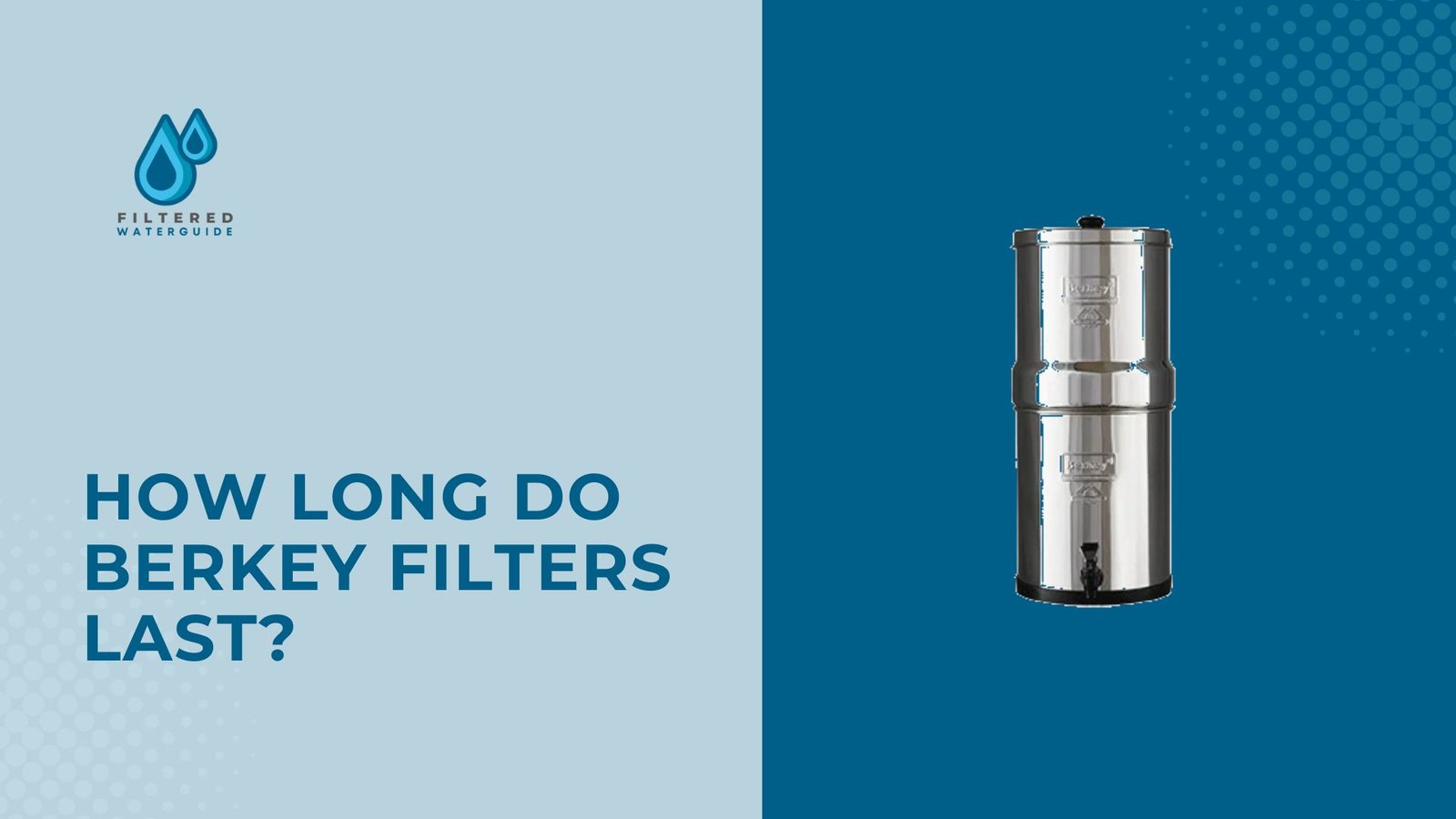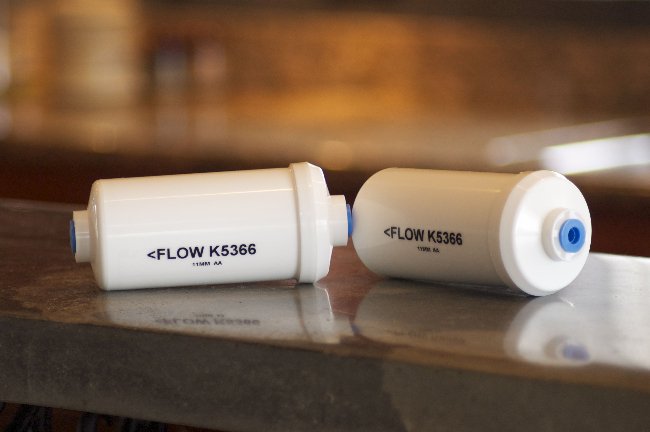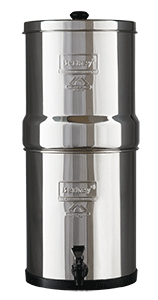Filteredwaterguide.com is supported by readers. If you purchase through referral links on our site, we make a commission at no extra cost to you. Learn more.
How Long Do Berkey Filters Last? – When to Replace Your Filters
When it comes to maintaining the quality and safety of your drinking water, Berkey water filters are an excellent choice. However, a common question that arises for many users is, “How long do Berkey water filters last?” or “When should I replace my Berkey water filter?”
Today, we’ll dive into these questions and provide practical tips to ensure your Berkey filter functions at its optimal capacity.
More Resources about Berkey:

How Long Do Black Berkey Purification Elements Last?
Each Black Berkey purification element has a life expectancy of approximately 3,000 gallons, translating to 6,000 gallons for a typical setup using two filter elements. In terms of timeframe, with an average usage of 10-12 gallons per week, the Black Berkey elements can last for about 4-5 years.
The Black Berkey purification elements are the powerhouse of the Berkey water filtration system, effectively removing a wide range of contaminants. The longevity of these filter elements is one of the main reasons for the popularity of Berkey systems.
It’s important to remember that the actual lifespan of the filter elements may vary depending on several factors, such as the quality of the water being filtered and the volume of water purified daily.
Factors Affecting Filter Lifespan
There are several factors that can impact the life expectancy of the Black Berkey purification elements. Understanding these factors will help you better manage the maintenance and replacement of your filters.
Water Quality
The quality of the water being filtered significantly impacts the lifespan of the filter elements. If the water source is highly contaminated, the filters may need to be replaced more frequently.
Water Usage
The more water you filter daily, the faster your filters will reach their capacity. For instance, a family of four using 10-12 gallons per week will likely see a longer lifespan than a larger family consuming 15-20 gallons per week.
Proper Maintenance
Regularly cleaning the filter elements and ensuring proper installation will help prolong their lifespan. Neglecting maintenance can lead to clogged filters and decreased efficiency.
By understanding the lifespan of Black Berkey purification elements and recognizing the factors that can influence their durability, you can better manage the maintenance and replacement of your filters. This will ensure that your Berkey water filtration system continues to provide clean, safe, and great-tasting water for years to come.
How Long Does the Berkey Fluoride Filter Last?
The Berkey Fluoride Filter, also known as the Berkey Fluoride and Arsenic Reduction Elements, plays a crucial role in enhancing the quality of filtered water. Primarily designed to remove additional contaminants, the Fluoride Filter complements the work of the Black Berkey Purification Elements.

Lifespan of the Berkey Fluoride Filter
The Berkey Fluoride Filter is designed to process approximately 1,000 gallons of water. This means with an average consumption of 10-12 gallons per week, a typical household should aim to replace the Fluoride Filter approximately once a year. This frequency ensures that the filter consistently removes unwanted fluoride and arsenic from your drinking water.
However, similar to the Black Berkey elements, the actual lifespan may vary depending on factors like water quality and daily usage.
Signs That Berkey Fluoride Filter Needs Replacement
Recognizing the signs that your Fluoride Filter needs replacement is essential to keep the water purification process effective. Here are some signals that may indicate the need for a filter change:
Changes in Taste
If your filtered water develops an unusual taste, it could be a sign that the Fluoride Filter is due for replacement.
Fluoride Levels
If you have the means to test fluoride levels and notice an increase in fluoride content, this clearly indicates that your filter is nearing the end of its lifespan.
Understanding the lifespan of your Berkey Fluoride Filter and identifying signs of a worn-out filter is vital in maintaining a consistently high quality of drinking water. Regular maintenance and timely replacement of filters are crucial to ensuring that your Berkey system serves you with clean, safe, and fluoride-free water for years to come.
How Can I Tell If I Need to Replace My Berkey Filter?
Recognizing when to replace your Berkey filters is crucial to ensure the effectiveness of your water purification system. Several key indicators can signal the need for a filter replacement.
Red Dye Test
One of the unique features of the Berkey system, often overlooked by competitors such as those mentioned above, is the Red Dye Test. This test is a straightforward and reliable way to check if your Black Berkey elements are still functioning properly.
Simply fill the upper chamber with water, add red food coloring, and then let the system run. If the filtered water is clear, your elements are working fine. If the water has a pink tinge, it’s time for a replacement.
Observe the Flow Rate
Another key indicator of the filter’s health is the rate at which water flows through it. If you notice a significant slowdown in the filtration rate, this could be a sign that your filter is nearing the end of its lifespan.
Slow flow rates can result from clogged filters that require cleaning or replacement. Regular cleaning of the filter elements can help maintain a good flow rate, but if this issue persists after cleaning, it’s probably time for a new filter.
Taste
Changes in the taste or odor of your filtered water are often a clear signal that the filters might be due for replacement. Clean water should generally be tasteless. If you notice a sudden or gradual change in the taste of the water, it could indicate that the filters are no longer functioning optimally. Often, this change can manifest as a metallic taste or an unusual sweetness, bitterness, or saltiness.
Odor
A properly functioning Berkey filter should also remove unpleasant odors from your water, resulting in water that smells fresh. It could be a sign of a worn-out filter if you detect odors such as chlorine, rotten egg, or a musty smell in your filtered water.
Over time, as filters reach their capacity, they may lose their ability to adsorb and remove certain contaminants effectively. Some of these residual contaminants can impact the taste and smell of the water.
To respond to these changes, first, clean and re-prime your filters, as an accumulation of sediments can sometimes cause these issues. If the problem persists after cleaning, it is likely time to replace the filters.
Remember, you are the best judge of your water quality. Trust your senses. If something seems off with the taste or odor of your water, it’s always better to err on the side of caution and inspect your filters. Consistent attention to the taste and smell of your water will ensure that your Berkey system continues to provide the high-quality water you’ve come to expect.
How to Extend the Lifespan Of a Berkey Water Filter
While Berkey water filters are designed for durability and a long lifespan, their effectiveness can be maximized with proper care and maintenance. Here are some essential tips that can help you prolong the lifespan of your Berkey water filter.

Regular Cleaning
Over time, the filters can become clogged with sediment and other impurities from the water. Regular cleaning helps to remove these particles and prevent the pores in the filter from becoming blocked.
Make it a habit to clean your Black Berkey elements every six months or so, or more frequently, if you notice a significant decrease in the flow rate. Use a Scotch-Brite pad or a similar cleaning tool to scrub the surface gently.
Proper Storage
If you are not planning to use your Berkey system for a while, it’s essential to store the elements correctly.
Dry them thoroughly before storage to prevent the growth of bacteria or mold. Also, remember to keep the elements in a clean and dry place with adequate ventilation.
Pre-Filtering
If the water you are filtering is particularly turbid or contaminated, consider pre-filtering it. This can help remove larger particles that might clog the microscopic pores in the Black Berkey elements, thereby enhancing their lifespan.
Avoiding Chemicals
While Berkey filters are powerful and can remove a wide range of contaminants, they are not designed to filter out certain chemicals such as oils or dishwasher soap. Avoid allowing such substances to come into contact with the filters.
Using Berkey Primer
The Berkey Primer can help extend the life of your filter elements. It is designed to push air and water out of the filters, preparing them for use and ensuring a more efficient flow rate. It can also be used to purge the filters, expelling any accumulated contaminants or sediments.
Proper Installation
When installing your filters, ensure they are screwed on correctly – not too tight, not too loose. Incorrect installation can damage the filter or reduce its efficiency.
By following these tips, you can maximize the lifespan of your Berkey water filters and ensure they continue to deliver pure, clean water. This not only helps you save money in the long run but also contributes to a more sustainable lifestyle by reducing the frequency of filter replacements.
Are Berkey Filters Long Lasting?
Berkey water filters are known for their durability, efficiency, and long lifespan. The Black Berkey purification elements, designed to last approximately 3,000 gallons each, can serve a typical household for several years. Their companion, the Berkey Fluoride filter, ensures an added layer of purification for about a year under regular usage.
The beauty of the Berkey system lies in its simplicity – it provides clear indicators for filter replacement, like changes in the flow rate, and it allows for testing of the purification elements through the Red Dye Test. Unlike many other water filtration systems, these straightforward tests take the guesswork out of knowing when to replace the filters.
While this article has provided a general guideline on the lifespan of Berkey filters, remember that the exact time can vary based on the quality of your water source and the volume of water filtered daily. Frequent cleaning and proper maintenance of your Berkey system will also go a long way in extending the life of your filters.
Final Thoughts
Knowing “How long do Berkey water filters last?” and understanding “When to replace Berkey filters” are vital aspects of maintaining a robust and efficient water purification system. By ensuring that your filters are replaced at the appropriate time, you can enjoy the peace of mind that comes from knowing you have a constant supply of clean, safe, and refreshing water.
And while you do this, don’t forget the environmental impact you are having by choosing a sustainable water filtration system. Not only are you guaranteeing the health and wellness of your family, but you are also playing a part in reducing plastic waste from single-use water bottles.
So, keep hydrating and keep making a difference, one pure drop at a time.


